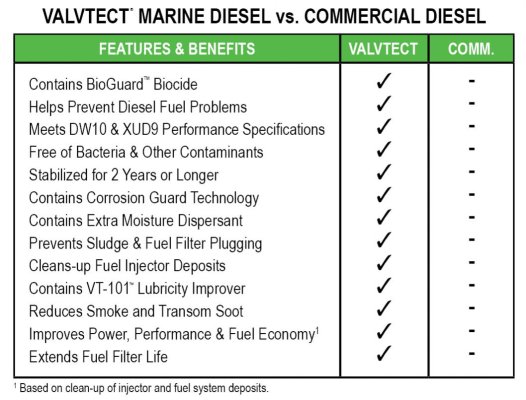Additives are a subject that have been discussed here on several occasions. It's a fraught subject as virtually every comment is anecdotal, including my own. It can be summarized as, "I always use XYZ additive and have never had a fuel problem, therefore XYZ additive is preventing me from having fuel problems". Unless, however, you run a control on this experiment it's of little value.
I am not a fan of biocides (BioBor and others) if they are not needed, and they are only needed if water is present, as biological life cannot exist without water. If you have water in the tank, the bio life is only part of the problem, you have the potential for corrosion and fuel injection system damage as well, and thus good reason to have a means of water removal, and once the water is gone, there's no bio growth issue.
I'm not suggesting BioBor doesn't work, it is a biocide, I'm simply saying using it prophylacticly, without water is unnecessary, and if you do have water, you have other problems. Biocides treat the symptom rather than the cause.
Some additives use an emulsifier, which enables fuel and water to mix, sending the water into the combustion chamber and out the exhaust. IMO this is less than ideal, we go through a lot of trouble to separate water from fuel and capture it in filters. Emulsification reverses that, albeit a little bit at a time. Most engine manufacturers prohibit alcohol based emulsifiers, so watch out for those especially.
Others, like Stanadyne PF and StaBil use a demulsifier, which promotes
separation of water from fuel, so it can be drained off from a tank well drain, or a stripper tube. If you have the ability to remove water from a tank bottom, a demulsifier makes much more sense IMO.
I have nothing to go by except 30+ years of professional use in both clients' and my own engines, i.e. anecdotal, and I use Stanadyne Performance Formula with every tank, and Gold Eagle StaBil for stabilization.
More on additives here
https://stevedmarineconsulting.com/diesel-fuel-additives-part-i/
Fuel tank design and stripper tubes here
https://stevedmarineconsulting.com/cleaning-diesel-tanks/
Stanadyne PF does the following...
Restores/Increase Horsepower: Detergents clean deposits in the injection system resulting in improved combustion, better acceleration, power, and torque
Reduces Fuel Consumption: Independent tests show an average of 4% improvement in MPG and gains up to 9.6%
Cetane Improver: Improves combustion resulting in better engine starting, smooth running, and reduced engine noise
Meets all engine fuel system requirements and will not harm exhaust aftertreatment systems
Reduces Emissions: Reduces smoke and particulates
Cleans and Protects: Detergents and deposit modifiers help protect injection pumps, injectors, nozzles, etc.
Reduces Wear: Lubricity improvers restore lubricity to ultra low sulfur and other low lubricity diesel fuels
Stabilizes Fuel: Keeps fuel fresher and protects against formations of gums caused by oxidation
Cold Weather Protection: Improves diesel pour point up to 40°F (22°C), and cold filter plug point by up to 25°F (13°C), depending on base fuel
Corrosion Preventative: Corrosion inhibitors will protect the fuel system from rust and corrosion
Helps Remove Water: Special demulsifiers cause tiny water droplets to come out of suspension/emulsion, so the filter/separator can more effectively remove water
Contains No Alcohol: Avoids corrosion and accelerated wear
Specially formulated for use with ultra low sulfur diesel fuel
Can also be used with Bio Diesel Fuel up to B20 (20% bio content approved), increased water separation shown in bio content up to B20

